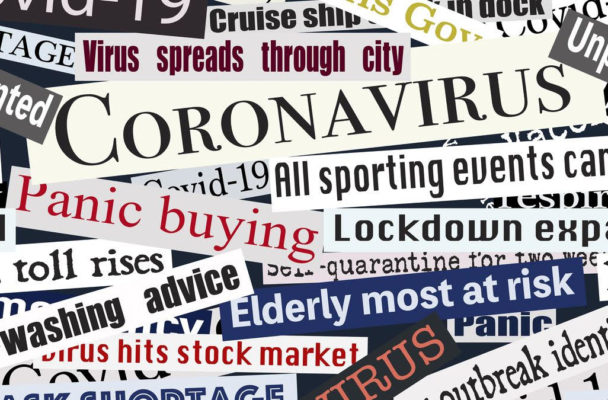The dangerous nature of conspiracy theories

Conspiracy theories often emerge in times of chaos, similar to the ongoing pandemic. Image from Vox
By Ally Ortolani
Opinion Editor
I would be lying if I said I didn’t partake in conspiracy theories. I’m talking about when you’re lying in bed at 3 a.m. with nothing better to do except watch videos on whether or not the Earth is flat. Or, whether or not the moon landing was a hoax directed by Stanley Kubrick. All jokes, of course.
Sure, to a certain degree, conspiracy theories can be fun and entertaining — or just something you do when you can’t sleep at night. At the same time, conspiracy theories can be dangerous.
The pandemic has created a great deal of uncertainty and fear among individuals. And along with that come conspiracy theories. Allow me to name a few: You don’t need to wear a mask; the COVID-19 vaccine microchips individuals; and masks are a way the government manipulates the populace.
To many, these seem ludicrous. However, there are people who legitimately believe that you don’t need to wear a mask. As High Point University students, we know this is categorically false.
Conspiracy theories often arise in moments of crisis, such as the ongoing pandemic.
“There are other things that can also cause conspiracy theories to thrive — for example, psychological biases, like proportionality bias, which is when we assume that big events must be explained by something equally big,” said social psychologist and researcher Daniel Jolley in an interview with Gwyneth Paltrow’s lifestyle and wellness company, goop. “This can be found in almost every significant event in history: 9/11, the moon landing, vaccines, climate change and of course, the COVID-19 pandemic.”
Jolley adds that these conspiracy theories — though the narratives may be tempting to some — can be egregiously harmful to public health. In other words, wear a mask to stop the spread. It’s fairly simple.
Certainly, the harmful nature of spreading misinformation about a pandemic isn’t the only conspiracy theory that is dangerous and harmful. Take anti-vaxxers, who avoid vaccines on the premise that they are “dangerous” and “unhealthy.” I have seen several pages on Facebook that are for individuals that oppose getting vaccinations.
“The anti-vax movement is born from concern over personal or familial health, fear that the current system poses risks we don’t know, and it’s usually rooted in a negative experience with health professionals,” said Student Voice’s Storytelling Program Coordinator Gabriella Staykova.
Like many conspiracy theories and the ongoing pandemic, the anti-vax movement can be traced back to fear and distrust. This poses the question: How can people ensure they are not spreading false information?
“People need to have the skill set to evaluate evidence and check sources,” Jolley said. “Engaging in critical thinking before sharing or believing information that has been shared can stop the spread of misinformation.”
It is of the utmost importance to engage in critical thinking. Ask yourself the following questions before you want to share information:
Can the person writing this particular tweet or social media post be trusted? Are they credible?
What is the general coverage of this topic? Are other trustworthy news sources saying the same thing?
What is the landscape of the topic? Is the topic politically motivated?
It is equally as important to also take some time to do a quick search to see what other individuals are saying and cover all your bases.
Stop and think.
In a society where individuals can easily spread false information, it is crucial to do your research, especially when it comes to online conspiracy theories. As individuals, we have the power to stop the spread of misinformation. The change starts with us.
The best way to approach these situations is with simple, plain facts, along with data from credible sources. It may be hard to change extreme opinions, but the hopeful payoff to a better-informed future is well worth it.